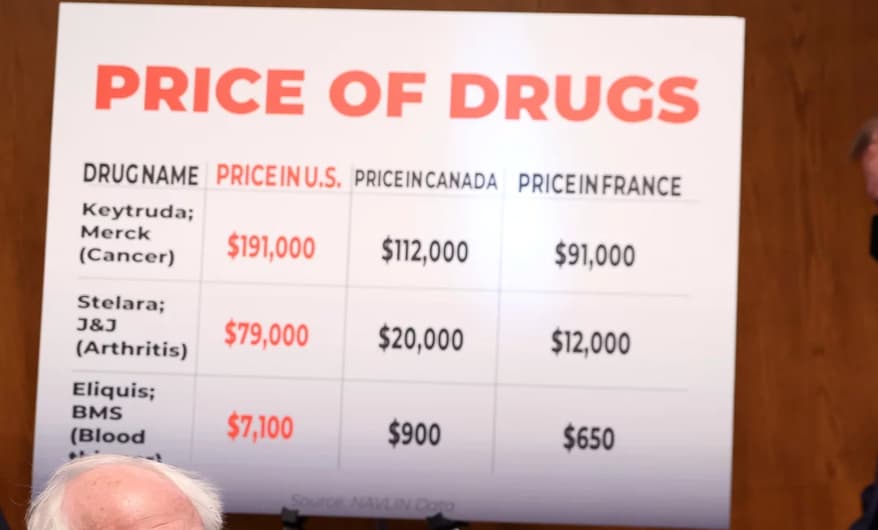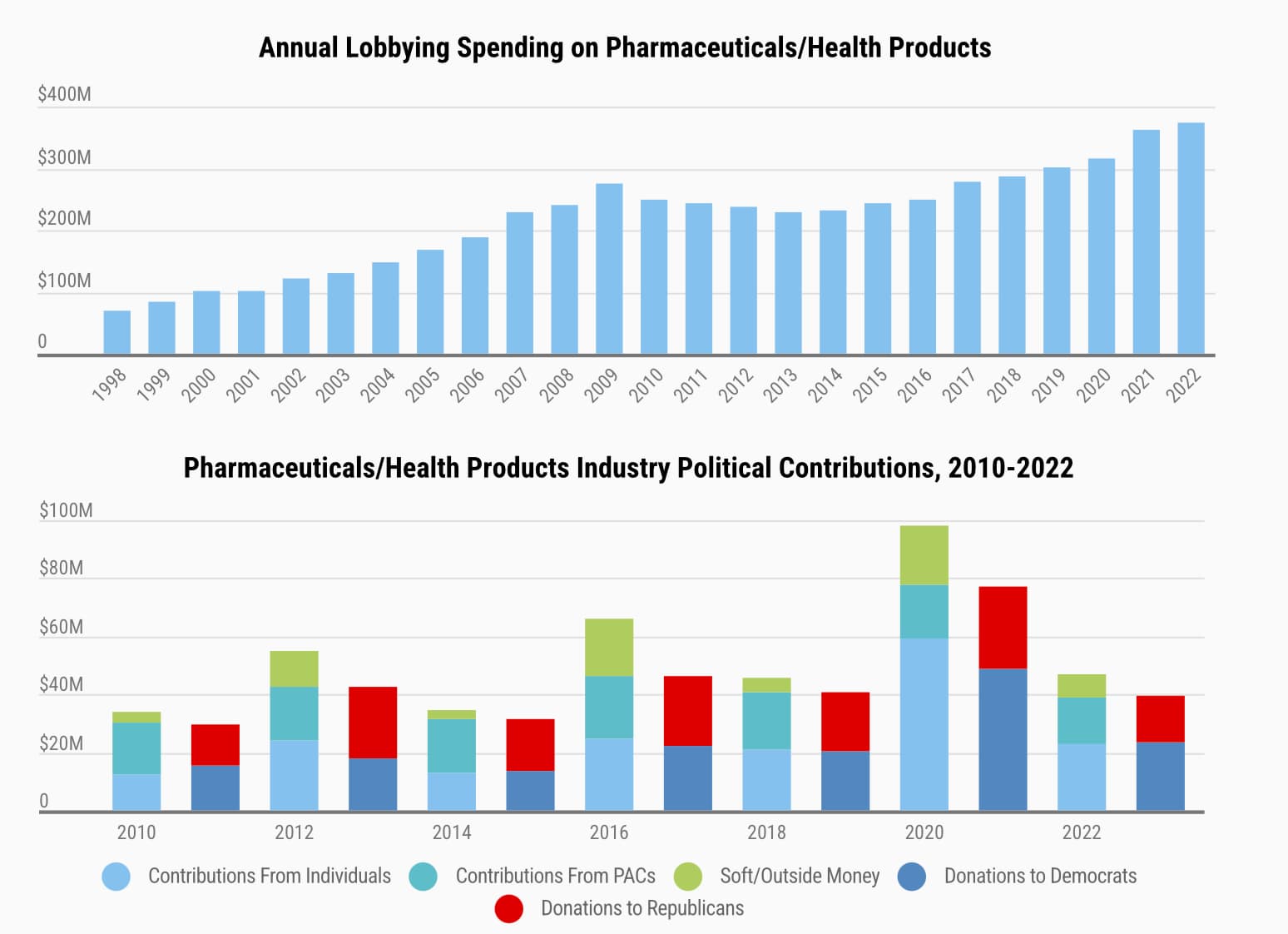They are far from being prisoners of the system because they have enormous power to shape the system. Indeed, some argue that they have captured the system. Big Pharm’s strong influence over the FDA and the drug approval process is inherently evil, in my view.
Yes, this is now true: their incentive is to keep the system as it is, increase barriers to entry, and avoid new entrants.
Even if Big Pharma can be pretty shady at times, many of us would probably already be dead without them.
I think the most impactful discoveries, like most commonly used antibiotics, were made before big pharma
No matter how much we can love big pharma, their behavior in the US is disgusting. The whole article is crazy.
Yes - the level of legal corruption in the US due to so called “lobbying” is truly astounding to anyone who has lived in other western countries and is used to less corrupt systems. Of course drug prices are high in the US, the politicians (on both sides) are paid very good money to allow the Pharma companies to keep them high (and not allow medicare to negotiate drug prices, as other countries do).
Roughly 9 million American adults did not take their drugs as prescribed in 2021 due to the high cost of medications, according to a federal survey. Prescription drug prices in the U.S. are more than 2.5 times as high as those in other high-income nations, another federal report showed.
Source: https://www.cnbc.com/2024/02/08/jj-merck-bristol-myers-squibb-ceos-senate-drug-price-hearing.html
I listened to a good podcast on this issue a while back, the conclusion is the US is just as corrupt as China, but the corruption is in different forms:
Is the US less Corrupt than Russia? I don’t know, but reasonable people argue there is no difference: The Baltimore Sun: Is the U.S. less corrupt than Russia?
Some data points:
The pharmaceutical and health products industry poured over a record amount — more than $373.7 million — into lobbying and outspent all other industries in 2022, according to data compiled by OpenSecrets.
source: Pharma Spent Record Amount on Lobbying in 2022; PBMs Are Now in Spotlight - MMIT
Last 25 years: Pharma spent $8.5 billion on lobbying and campaign contributions
From 2020, but equally true today:
The world’s biggest drug makers and their trade groups have cut checks to 356 lawmakers ahead of this year’s election — more than two-thirds of the sitting members of Congress, according to a new STAT analysis.
It’s a barrage of contributions that accounts for roughly $11 million in campaign giving, distributed via roughly 4,500 checks from the political action committees affiliated with the companies.
Related:
It was also doctors that prescribed it. And now doctors are not prescribing things for prevention. It is not reasonable that cardiovascular disease is the leading cause of death, for example. Once apoB decreasing vaccines are here it will be seen in the same light I suspect.
I could find a very good doctor, but it is a question of money and class then.
Amazing podcast about semaglutide, with really interesting takes about big pharma: Novo Nordisk (Ozempic): The Complete History and Strategy
The picture really is like, as an industry, are they over earning? No, they used to until 2000. But nowadays, the ROIC numbers are just actually not that interesting.
In fact, some would argue as pharma gets less and less efficient, capitalists should just not allocate their dollars there, because there’s literally not enough incentive in the profit dollars that you get to earn from your drug after it’s patented for many years. Should you actually index the pharma sector? Probably not. It’s a little better than other sectors, but not necessarily enough to take the sector risk of putting all your dollars there.
Pharma as a whole of the medical pie only occupies about 13% of revenue. I really would have thought, with all the hate toward Big Pharma, that it would be higher.
David: Thirteen percent of revenue in the healthcare industry?
Ben: Yeah.
David: That means 87% of health care revenue is not going to pharma.
Ben: Right. If you could trade never having drugs again or never having doctors again, which one would you pick?
David: Wow, that’s a good question. I hadn’t even thought about that.
Ben: It’s, of course, farcical.
Ben: Yeah, of course it is. But do you think drugs only provide 13% of the value to all of healthcare?
David: No, certainly not.
Ben: It’s crazy.
David: Definitely more than that.
Ben: I will say, who is taking any risk in this whole ecosystem? It’s only pharma. Who’s taking risk to innovate and make anything better? Every other bet that a hospital makes or that an insurance company is just probably going to pay off.
This is actually pretty interesting. If you look at the net income of a pharma company, and let’s just take the biggest one or a very large one, Pfizer, super spiky, even though they’re diversified, up down, up down, up down. In some years they make very little profit, some years they make a lot of profit. That is what you should expect from someone who is taking risk, trying to innovate, sometimes they succeed, sometimes they don’t.
By the way, let’s define insurance company. Insurance company is someone that, in the good years, collects money, and then in the bad years, they have a big loss. Hopefully, they collected enough money such that they can still make some profit after covering the losses, like a hurricane hits. The insurance company has a bad year. Does that ever happen if you look at the net income of the big insurers? No.
David: Yeah. This is no surprise here, but health insurance in the US is not insurance. It’s access.
Ben: It’s a hundred percent right. We just had the single greatest healthcare crisis in the last several decades with Covid. What happened to the profits of the big health insurers? They stayed flat or grew. We aren’t here on acquired to demonize people for making money or for being capitalists, but I do think we should call a spade a spade.
The health insurance companies are not actually insurance. They’re not actually holding the bag as the funder of last resort when calamity hits. It’s the government, so really it’s the taxpayers. The big insurance companies and the PBMs make good profits in the good times, but the taxpayer funds the bad kinds.
I would be kinder here to the middlemen of the industry if I thought they were innovating and taking risk the way that the drug companies are. But the incredible consolidation that’s happened among insurers, PBMs, frankly, even the hospitals and pharmacies too, there are either local monopolies in the hospital case or a three-race oligopoly in every other part of the value chain that really is just obfuscated and insulated profits.
After reading this I agree that for all their flaws, big pharma takes way more hate than any other industry, and especially than other players in the healthcare system. PMBs (in the US) private insurers, doctors, hospitals, and pharmacies represent 87% of healthcare revenues, and they definitely don’t bring 87% of the value. To Ben’s question, “If you could trade never having drugs again or never having doctors again, which one would you pick?” I would definitely prefer to have all the best drugs in the world and zero doctors.
I wonder what percent of their revenue is spent on bribes? Maybe a little harsh, but they pay for a lot of TV news in order to get no bad coverage, also fund university departments… send money to doctors to go on trips. I bet the marketing VP’s get more pay than the science guys and they probably get their way on things too.
- Every single industry does that.
- They need to do it even more because of all the useless middlemen in this industry (especially PBMs).
- No matter how much they spend on this, it doesn’t change that their revenue is still a tiny portion of all healthcare revenue.
Who will diagnose you? Who will set the bone if you break your foot? Who will operate on your burst appendix?
Is it ethical or legal? In my view, there’s only one word for it: corruption.
Diagnosis: I guess today 90%+ of diagnoses (diabetes, hypertension, etc.) are not really done by doctors. Just a blood test or equivalent (ECG, ABPM, etc.) and a threshold set in stone. A nurse might be involved. And then at best the doctor signs the document. (I know that for sure as my in-laws own dozens of hospitals and radiology centers and do thousands of MRIs per week.) There’s of course a minority of cases where you need an expert doctor to look at different sets of data to make a diagnosis.
This rhetoric question was about “drugs vs doctors”. So surgery was obviously not part of that. Because these conditions are usually not drugable. And they can be done by nurses by the way. But even for surgery, in many cases it does not perform better than placebo: Surgery Is One Hell Of A Placebo | FiveThirtyEight ![]()
So yes, between new drugs and doctors I prefer new drugs. 100%. The difference between today and the Middle Age is the new drugs + the diagnosis tools. Doctors are the same human beings. They haven’t changed over the centuries.
What is “it”? Marketing to potential customers? Yes it’s ethical and legal. Lobbying to influence the legislation? It’s for sure legal. Is it ethical? It depends what you advocate for. I do lobbying every day to advocate for better incentives for generic drugs. I think it’s ethical. If you do lobbying to prevent competition in pharma, yes, that’s unethical.
Then is it corruption? If there’s no money involved (or any kind of gift): no.
Those that are really corrupts are the PBMs in the US.
Hmmm… let’s see here. Yeah your LDL cholesterol is in the 94th percentile but we can’t really do anything about that as I’ve put this into my calculator here which gives a 10 year risk score of 3.2%. Yeah I really went to medical school for this.
20 years later. Oh wow I just put your numbers again, but I see your age has increased by 20 years, and now the 10 years risk score is 8.2%. That means you need to take a statin! I’m so smart.
Haha. Also, same patient, 136 mm Hg BP:
- European doctor: “Your BP is normal, it’s OK. Everything is fine; you’re healthy.”
- American doctor: “You have hypertension; you should start medication.”
Because, somehow, European hearts function differently I guess? And yet the impact on life expectancy would be massive: https://twitter.com/Paddy_Barrett/status/1756604642912350369
There is just so much misunderstanding there. Diagnoses are not based on test results but test results are used to exclude diagnoses on the differential diagnosis. Positive test results without a clinical suspicion are most likely false positives
Or worse yet, your doctor is the kind of stupid who only selectively reads the kind of papers he agrees with and pushes his agenda on patients. Just like in any profession there are massive frauds and they are hold held up to the same standard the pharma industry is.
I sense a lot of pent up frustration here. Just as in any profession, some doctors are skilled, capable and enthusiastic. Others not so much. If you have the latter doctor, I suggest you vote with your feet and choose a better physician for yourself. If you are stuck with a poor physician, you have only yourself to blame IMHO.
For many that do not have the medical knowledge we have, a good doctor is a lifesaver. Literally.
Just remember your average person has no idea what these medications are or do and they need a doctor to guide them towards better health
I think I am well aware of that fact. I am talking about the system and for the average person. The average person does not have the knowledge to determine which doctor is better. There is also very few who would fit that criteria so there is not enough good doctors for everyone. The entire system should change from medicine 2.0 to medicine 3.0 under Peter Attia’s definition, which would uplift everyone. I think it will take awhile.
The doctors are bad because the system is, they are following the guidelines… For CVD that is a risk calculator based on an epidemiological study, for example. It’s modern day Lysenkoism.
No, not “just as in any profession”, because they’re regulated and not open to competition. If a cook is bad, they’ll soon be out of business. If a doctor is bad, they can always have patients because there’s a small supply for a massive demand. Open up the profession, and you’ll soon see prices decrease and quality increase.
FYI, if you’re part of a socialized healthcare system, you might not be able to choose (for instance, in the UK). And good doctors are so rare that they either don’t take patients anymore or are not affordable for most people. (I’m lucky; mine is good; shout out to Adam Bataineh, btw for those in the UK: https://www.numenor.health ).
100%.
Yes. It’s just that ChatGPT would do the job better. Or any member of this forum actually. Again, for the top 10 most common diseases and for basic stuff.


